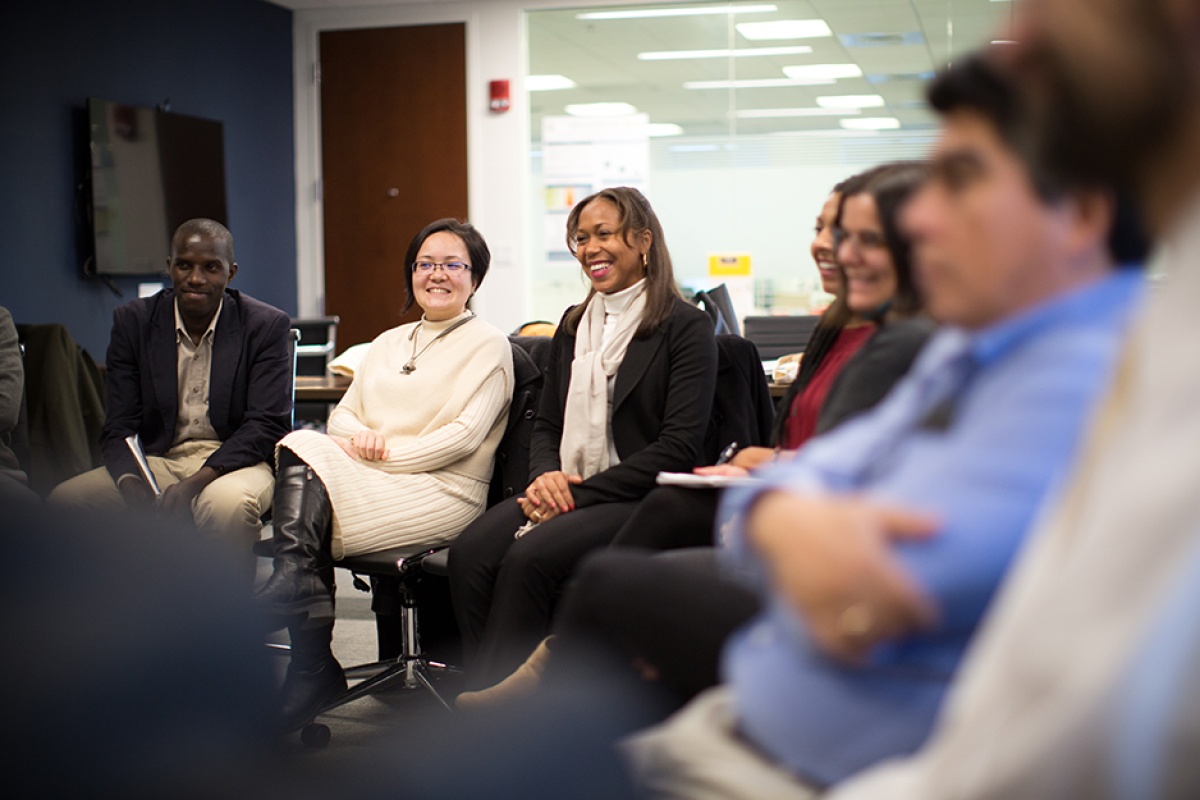Global Views, Local Ideas: Lab Leaders Collaborate at Annual Workshop
Posted on May 17, 2018

Laboratory Director Roger Calderon needed more space to support tuberculosis work in Lima, Peru, so he led design and construction of a new lab made from a shipping container. Four people can work in the 400-square-foot facility, which has centrifuges, freezers and a customized ventilation system that recirculates the air 27 times an hour.
Lab Manager Mokenyakenya Matoko needed a better way to manage information at Botšabelo Hospital in Maseru, Lesotho, so last November he implemented a system that tracks samples, ensures patient data is backed up and enables staff to process stocks electronically, rather than on paper.
Fabienne Anglade, a pathologist and interim lab director in University Hospital in Mirebalais, Haiti, needed a faster way to get analytic results for samples and specimens. So she streamlined the analysis process, reducing the turnaround time by 10 days in just six months and enabling express results for emergency cases.
The three innovators recently shared those experiences, and many others, with nine of their fellow laboratory leaders from Partners In Health sites, at the second annual PIH Lab Workshop and Training. The weeklong event was held in Boston in March.
Goals of the event included sharing expertise, standardizing lab practices, building a cross-site support network, implementing new policies and lab tools, and more. Daniel Orozco, director of laboratory services for PIH, said the workshop also was a time to step away from the microscope, and look at the bigger picture.


“It’s a very technical job, and it’s very easy to get immersed in lab work,” Orozco said. “Sometimes, we don’t stop to think about why diagnostics matter.”
PIH supports more than 20 laboratories across eight sites. Some are home to more basic diagnostic capacity; others are designed to focus on a single disease, such as tuberculosis. While some sites, like Sierra Leone, have had lab facilities for only a few years, others, like Haiti, have had such capabilities for decades. Laboratory expertise and technology also vary across sites, depending on whether staff are catering to a small clinic or a large referral hospital.
Challenges like machine failure can vary, as well—and sometimes occur even at newer facilities like University Hospital, despite specialized technologies. Orozco said new, highly specialized equipment needs to be incorporated into lab environments with appropriate levels of planning, training and support.
Those necessities are not always there.
“Our lab staff work under very difficult circumstances,” Orozco said. “Sometimes there is no electricity. Sometimes there is no water.”
And amid all of that, he added, lab work generally gets much less attention in medical circles than highly touted vaccines or drugs. But even the best medicines are worthless without accurate diagnoses and research, which can involve not only short-term symptoms but also long-term analysis, as lab technicians follow the course of a disease over months or years.
“Without diagnostics, medicine is blind,” Orozco said, quoting Alain Merieux, president of the Merieux Foundation, which supports laboratory networks and the fight against infectious disease in developing countries.
PIH held its inaugural lab workshop a year ago in Toulouse, France. This year’s Boston location meant a first trip to the U.S. for Zhanel Zhantuarova, a lab quality officer in Kazakhstan.
Taking a break from a training on a blood sample machine at Harvard Medical School, Zhantuarova said “interesting” didn’t even begin to describe her week.
“The only problem is that it goes too fast,” she said. “They need to slow down the time.”
Zhantuarova said being in Boston enabled her to work in person with other Kazakhstan team members; meet PIH Co-founder and Chief Strategist Dr. Paul Farmer for the first time; and even take in a screening of “Bending the Arc,” the 2017 documentary that tells the story of PIH’s evolution from a small village in Haiti three decades ago, to an organization working in some of the poorest settings around the world.

“I was so moved,” she said of the film.
Zhantuarova also said she had talked at length about clinical trials and other topics with Calderon, who has more than 20 years of experience with Socios En Salud, as PIH is known in Peru. The interaction was invaluable.
“He gave me his card and told me to contact him whenever I have questions,” she said.
PIH CEO Dr. Gary Gottlieb said PIH’s lab teams exemplify, “the very best of accompaniment and direct work on the ground,” with results that are vital to PIH’s success.
“A broad array of trustworthy lab data is critical to diagnostic precision," he said. "Excellent labs allow our clinicians to treat all of our patients more rapidly and more effectively, with the right medicines and treatments.”
“This team is as critical as any component in the delivery of care that we have."

